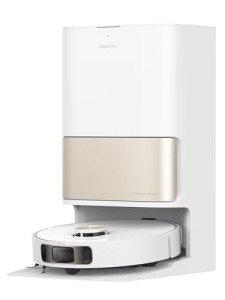Understanding Robot Vacuum Cleaner Prices: A Comprehensive Guide
In the last few years, robot vacuum cleaners have changed the method individuals clean their homes. Their ease of usage, convenience, and advanced technology have actually made them increasingly popular. Nevertheless, with a plethora of designs and functions offered, potential purchasers typically find themselves asking a crucial question: What should I expect to pay for a robot vacuum cleaner? This post intends to clarify the costs associated with robot vacuum cleaners, elements that affect their rates, and ideas for finding the best gadget for your budget.
The Price Range of Robot Vacuum Cleaners
Robot vacuum can vary widely in price. Here, we break down the normal price range for different classifications:
| Category | Price Range | Description |
|---|---|---|
| Entry-Level | ₤ 100 - ₤ 250 | Standard features, appropriate for small areas, minimal smart technology. |
| Mid-Range | ₤ 250 - ₤ 500 | Boosted cleaning capabilities, better navigation, some smart features. |
| High-End | ₤ 500 - ₤ 1,000+ | Advanced mapping, effective suction, internet connection, and app combination. |
Entry-Level Models
Inexpensive robot vacuums are perfect for those who need a standard cleaning tool without high-end features. They frequently manage hard floorings well however may have a hard time with carpets and are usually less long lasting.
Mid-Range Models
These vacuums often come geared up with much better suction power and more intelligent navigation systems, making them suitable for bigger homes with blended flooring. Lots of designs in this range offer Wi-Fi connection and smartphone control.
High-End Models
High-end robot vacuums are developed for serious cleaning lovers. They normally use innovative mapping technology, powerful suction, and integrated cameras for boosted navigation. Additionally, lots of high-end models permit for vacuuming on a schedule and even have the ability to empty their dust bins immediately.
Factors Affecting Robot Vacuum Prices
Understanding the elements that can influence the price of a robot vacuum can assist consumers make more educated buying decisions. The following list lays out some essential features that can affect price:
- Brand Reputation: Established brands usually bring a higher price due to their credibility and trusted consumer support.
Cleaning Technology:
- Suction Power: More powerful models will be more costly.
- Navigation Systems: Advanced models with much better obstacle detection and mapping abilities cost more.
- Smart Features: Models that provide connection to apps, voice control compatibility, and advanced scheduling options tend to be priced higher.
- Battery Life: Longer-lasting batteries generally cause a higher price, as they enable the vacuum to tidy bigger areas without requiring to charge.
- Dustbin Size: Larger dustbins can be more convenient for consumers, promoting a higher price point.
- Extra Features: Some vacuums use mopping capabilities, self-cleaning functions, and high-efficiency filters, which can increase their price.
Budget vs. Features: What to Consider
When acquiring a robot vacuum, it's necessary to weigh your budget against the features you most desire. Here are several considerations to help you make an informed choice:
1. Examine Your Home's Needs
- Size of Space: Larger homes may take advantage of advanced vacuums that can cover more ground without frequent recharging.
- Floor Types: If your home consists of a mix of carpet and hard floorings, decide for a vacuum created for both.
2. Determine Desired Features
- Choose which features are important for you, such as scheduling, app connection, and cleaning modes.
3. best home vacuum cleaner . Durability
- While a greater investment can yield longer-lasting designs, it's worth considering lower-cost choices if you're unpredictable about long-lasting use.
Regularly Asked Questions (FAQs)
Q1: Are robot vacuums worth the financial investment?
A1: If you lead a busy way of life or have mobility concerns, a robot vacuum can conserve substantial effort and time in cleaning, making them a rewarding financial investment.
Q2: How typically should I change a robot vacuum?
A2: Depending on the model and usage, a robot vacuum typically lasts in between 3 to 5 years. High-end designs might last longer with correct upkeep.
Q3: Can a robot vacuum completely replace a traditional vacuum?
A3: While robot vacuums efficiently handle everyday cleaning, they may not replace standard vacuums for deep cleaning, especially in multi-level homes or locations requiring comprehensive care.
Q4: What is the typical lifespan of a robot vacuum?
A4: The life expectancy of robot vacuums differs by design, but most last between 3-5 years with routine upkeep, like dustbin emptying and filter modifications.
Q5: Do robot vacuums deal with carpets?
A5: Yes, but the efficiency will depend upon the model. Higher-priced models generally have much better suction power to clean carpets successfully.
The marketplace for robot vacuum cleaners varies, with designs to fit numerous spending plans and cleaning needs. Whether consumers are trying to find a fundamental cleaning tool or an innovative gadget equipped with many smart functions, understanding the price varieties and elements affecting costs is essential. With mindful consideration of specific needs and monetary restraints, possible purchasers can discover a robot vacuum that will enhance their cleaning routine and supply long-lasting complete satisfaction.

